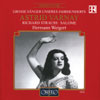R Strauss Salome
An uneven disc, worth having nevertheless for Patzak’s Herod and Varnay’s compelling characterisation, despite her too-opulent voice
View record and artist detailsRecord and Artist Details
Composer or Director: Richard Strauss
Genre:
Opera
Label: Orfeo d'or
Magazine Review Date: 10/2000
Media Format: CD or Download
Media Runtime: 96
Mastering:
ADD
Catalogue Number: C503002I

Tracks:
| Composition | Artist Credit |
|---|---|
| Salome |
Richard Strauss, Composer
Adolf Keil, First Soldier, Bass Astrid Varnay, Salome, Soprano Bavarian Radio Symphony Orchestra Benno Kusche, Second Soldier, Bass Hans Braun, Jokanaan, Baritone Hans Hermann Nissen, Cappadocian, Bass Hans Hopf, Narraboth, Tenor Hermann Weigert, Conductor Hertha Töpper, Page, Mezzo soprano Hildegard Limmer, Slave Julius Patzak, Herod, Tenor Karl Hoppe, First Nazarene, Bass Margarete Klose, Herodias, Mezzo soprano Max Proebstl, Second Nazarene, Tenor Richard Strauss, Composer |
Author: Alan Blyth
Varnay briefly undertook Salome at the start of the 1950s, relinquishing it when she realised (rightly) that her large, refulgent voice was better suited to the exigent demands of Elektra. Yet while she was singing Salome she made her mark in the role, not least at Covent Garden during the 1951-52 season. Here, in 1953, without her (no doubt) psychologically interesting acting, her tone already sounds too fulsome and rich for the role of the teenage princess. It’s true that Nilsson – who, like Varnay, was a superb Brunnhilde and Elektra, managed to be a satisfactory Salome on disc (Decca), because her voice was always brighter, more silvery than Varnay’s. In spite of that, Varnay is well worth hearing, nowhere more so than in her implacable demands for Jochanaan’s head on a platter, and also for her customary absorption in the role she is undertaking at any one time. On this occasion she was praised, rightly, by a Munich critic for her firm singing, her interpretative nuances and for turning the final scene into a kind of ‘Liebestod’. Still, on the whole I find Borkh on the even earlier Orfeo set from Munich (this time live off the stage) even more impressive.
There, too, you will find Hotter, once he is over a short fit of the wobbles, an unrivalled Jochanaan, noble, spiritual, rich-toned, deeply expressive. Krause (Solti) in his different, more aggressive way, is also commanding. Braun, as on the 1954 Decca/Krauss set (8/54 – nla), sings more than adequately, but sounds no more than like an angry bank manager. Yet, in every way, the set is worth hearing for Patzak’s superb Herod, with tone, diction and interpretation all precise and full of meaning and without the coarse exaggeration of Lorenz (Keilberth) and Stolze (Solti). By singing what Strauss wrote, Patzak shows how right the composer is in his markings. The veteran Klose is an effective Herodias, and Hopf, leading Heldentenor of his day, opens the opera almost too opulently as Narraboth. Kmentt (Solti) is superior there. Weigert, Varnay’s husband, conducts a satisfying performance but misses the insights, in their varying ways, of Keilberth and Solti. The recording is good mono for its day but it has the orchestra too distanced.'
There, too, you will find Hotter, once he is over a short fit of the wobbles, an unrivalled Jochanaan, noble, spiritual, rich-toned, deeply expressive. Krause (Solti) in his different, more aggressive way, is also commanding. Braun, as on the 1954 Decca/Krauss set (8/54 – nla), sings more than adequately, but sounds no more than like an angry bank manager. Yet, in every way, the set is worth hearing for Patzak’s superb Herod, with tone, diction and interpretation all precise and full of meaning and without the coarse exaggeration of Lorenz (Keilberth) and Stolze (Solti). By singing what Strauss wrote, Patzak shows how right the composer is in his markings. The veteran Klose is an effective Herodias, and Hopf, leading Heldentenor of his day, opens the opera almost too opulently as Narraboth. Kmentt (Solti) is superior there. Weigert, Varnay’s husband, conducts a satisfying performance but misses the insights, in their varying ways, of Keilberth and Solti. The recording is good mono for its day but it has the orchestra too distanced.'
Discover the world's largest classical music catalogue with Presto Music.

Gramophone Digital Club
- Digital Edition
- Digital Archive
- Reviews Database
- Full website access
From £8.75 / month
Subscribe
Gramophone Full Club
- Print Edition
- Digital Edition
- Digital Archive
- Reviews Database
- Full website access
From £11.00 / month
Subscribe
If you are a library, university or other organisation that would be interested in an institutional subscription to Gramophone please click here for further information.




